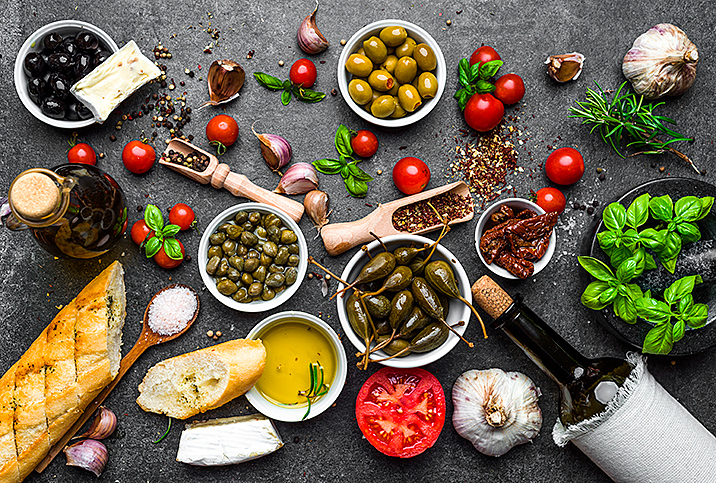Mediterranean Diet Linked to Reduced Preeclampsia Risk

The Mediterranean diet—a plant-based, anti-inflammatory nutrition plan rich in fruits, vegetables and whole grains—has been consistently linked to a host of health benefits, including reduced risk of cardiovascular disease, stroke, cognitive decline and type 2 diabetes.
Now, new research suggests the diet may also significantly lower the risk of adverse pregnancy outcomes (APOs), including preeclampsia.
The study involved nearly 8,000 pregnant people of different racial, ethnic and geographic backgrounds. Researchers wanted to uncover whether adhering to a Mediterranean diet lowers the risk of developing common APOs, including preeclampsia or eclampsia, gestational hypertension, gestational diabetes, preterm birth, delivery of a small-for-gestational-age infant and stillbirth.
For the study, researchers asked women who were pregnant with their first child to complete a questionnaire about their eating habits during the first three months of pregnancy.
The study found participants who reported greater compliance to a Mediterranean diet pattern had a 21 percent lower risk of developing an APO. Notably, the study found the anti-inflammatory diet was associated with a 28 percent reduced risk for preeclampsia, or high blood pressure during pregnancy. In addition to preeclampsia, the risk of gestational diabetes also decreased by 38 percent.
"This multicenter, population-based study validates that a healthier eating pattern is associated with a lower risk of adverse pregnancy outcomes, the most exciting being a 28 percent lower risk for preeclampsia," said Natalie Bello, M.D., lead author of the study and director of hypertension research at the Smidt Heart Institute at Cedars-Sinai in Los Angeles, in a statement. "Importantly, this connection between the Mediterranean diet and lower risk of adverse pregnancy outcomes was seen in a geographically, racially and ethnically diverse population."
Bello noted that the benefits appeared to be stronger for participants traditionally considered to be of advanced maternal age, or 35 and older.
About preeclampsia
Preeclampsia is a serious pregnancy complication that can threaten the life of mothers and fetuses. Preeclampsia occurs in an estimated 1 in 25 pregnancies in the United States.
Black women, in particular, have a higher incidence of preeclampsia compared to other ethnic groups in the United States, said Anum Minhas, M.D., a cardiology fellow at Johns Hopkins University in Baltimore who conducted a separate study investigating the impact of a Mediterranean diet on preeclampsia risk by race.
"Some of the risks during pregnancy, particularly for the baby, include fetal growth restriction—so small-for-[gestational-age] babies—and preterm delivery," Minhas said. "For mothers, the risks include damage to the liver, protein in the urine, seizures and low platelets."
She added that long-term preeclampsia creates a higher risk for heart disease, heart attacks, stroke and heart failure.
Minhas said the Mediterranean diet can help lower the risk of preeclampsia in a few ways. The first is by helping pregnant people maintain a healthy weight.
"It's a healthier diet, so individuals who follow the Mediterranean diet tend to gain less weight overall compared to those on a standard U.S. diet," Minhas said.
Gaining too much weight is considered a risk factor for preeclampsia.
A second way: "Other studies on the Mediterranean diet suggest that it helps reduce inflammation in the body," Minhas said. "So what we call reactive oxygen species [ROS] might be lower in those that follow a Mediterranean diet, and they might have better vascular function or blood vessel function as a result of the nutrients.
"Preeclampsia is a very vascular disease," she explained. "So the benefits of the Mediterranean diet in terms of improving vascular blood vessel function probably contribute to the lower risk."
For people who want to increase their odds of a healthy, complication-free pregnancy, Minhas shared this advice: "Try to exercise regularly, and that exercise can even be things like walking 30 minutes a day."
Of course, Minhas also recommended following a Mediterranean diet, which, "at its core, means increasing fruits, vegetables, healthy grains and healthy fats like olive oil and nuts."


















